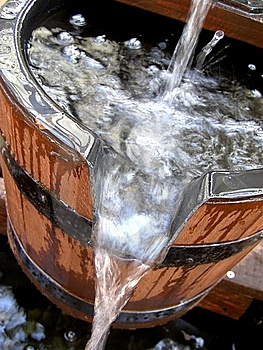By Brian Paris
As a part of our introduction to Papua New Guinea, my wife, Hannah, and I spent five weeks in a village. This is part of a set orientation course designed to transition new missionaries into living in a totally new environment. Some things are easier to adjust to than others. Many villages here do not have the amenities I am used to relying on in daily life. Things like electricity, air conditioning, and running water are a true luxury. During our time in the village, I set up a tarp to collect rainwater which we could drink without any treatment. This helped us to avoid having to collect and carry water from a nearby stream that would have required treatment with bleach or other chemicals before it would be safe to drink.
Shortly after we arrived it rained just enough to fill up our 20 liter bucket with fresh water. Hannah and I found that we used about 6 liters of water in day, so we knew that 20 liters would not go far. After a few days and as our water began to run low, it rained again. During the storm I cleaned out another bucket, making our total capacity 30 liters. That particular storm filled up both buckets.
 This continued for a time. I cleaned out food buckets as we steadily emptied them and it continued to rain exactly when we needed it, each time filling up all our buckets. But it added a new dimension to my life. Where I grew up, you never had to worry about water. When I was thirsty I just went to the kitchen sink and filled up my glass. In fact, water was so freely available that I usually wanted something more enticing, like Kool-Aid or sugar with a little bit of juice. If my only choice was water, it at least had to be cold. I never worried about it’s accessibility. In the village, however, I couldn’t stop worrying about it. Everyday I was consumed with fear that it wouldn’t rain and I had my plan in place for when we did have to go to the creek.
This continued for a time. I cleaned out food buckets as we steadily emptied them and it continued to rain exactly when we needed it, each time filling up all our buckets. But it added a new dimension to my life. Where I grew up, you never had to worry about water. When I was thirsty I just went to the kitchen sink and filled up my glass. In fact, water was so freely available that I usually wanted something more enticing, like Kool-Aid or sugar with a little bit of juice. If my only choice was water, it at least had to be cold. I never worried about it’s accessibility. In the village, however, I couldn’t stop worrying about it. Everyday I was consumed with fear that it wouldn’t rain and I had my plan in place for when we did have to go to the creek.
One morning I asked God to send rain because we “only” had 20 liters of water left. The thought occurred to me that we actually had enough water for three days, so I changed my prayer and asked for His help in waiting for Him to provide. The next morning we were down to 14 liters and I started to pray for rain, but again caught myself in the desire to have more than I needed for one day. The fact that we still had enough water for that day was all that mattered. The next morning, we had 8 which was still enough for the day, but the waiting was becoming very difficult. Finally the next morning came and we were down to 2 liters. We had come to the place where there was not enough. I explained to Hannah my plan if it didn’t rain that day, but I said, “I’m confident God will provide.” She looked at me like I was crazy, but to be fair I hadn’t shared with her this momentous test of faith I had been going through. She just responded with, “Okay.”
My faith has always been theoretical. I know that God provides for me, but it’s difficult to see that when you are raised by strong parents that seem to take care of everything. Somewhere in there I know that God provides, but it’s in a way that I easily overlook. But here, in a Papua New Guinean village, God had steadily brought me to the place where I was able to put my faith in Him alone to provide a basic need. As I looked up to blue skies in the morning I had no sense of doubt in His ability. Therefore, I wasn’t surprised when the rain did indeed start pouring at noon, but I was totally overwhelmed at His mercy of provision. We collected 45 liters in about 30 minutes that day. By the end of the rainstorm we had 65 liters of pure drinking water. And that was enough for the rest of our time in the village.
Brian and Hannah Paris are serving in the area of survey. They are currently allocated to Ukarumpa.
Comments are closed.